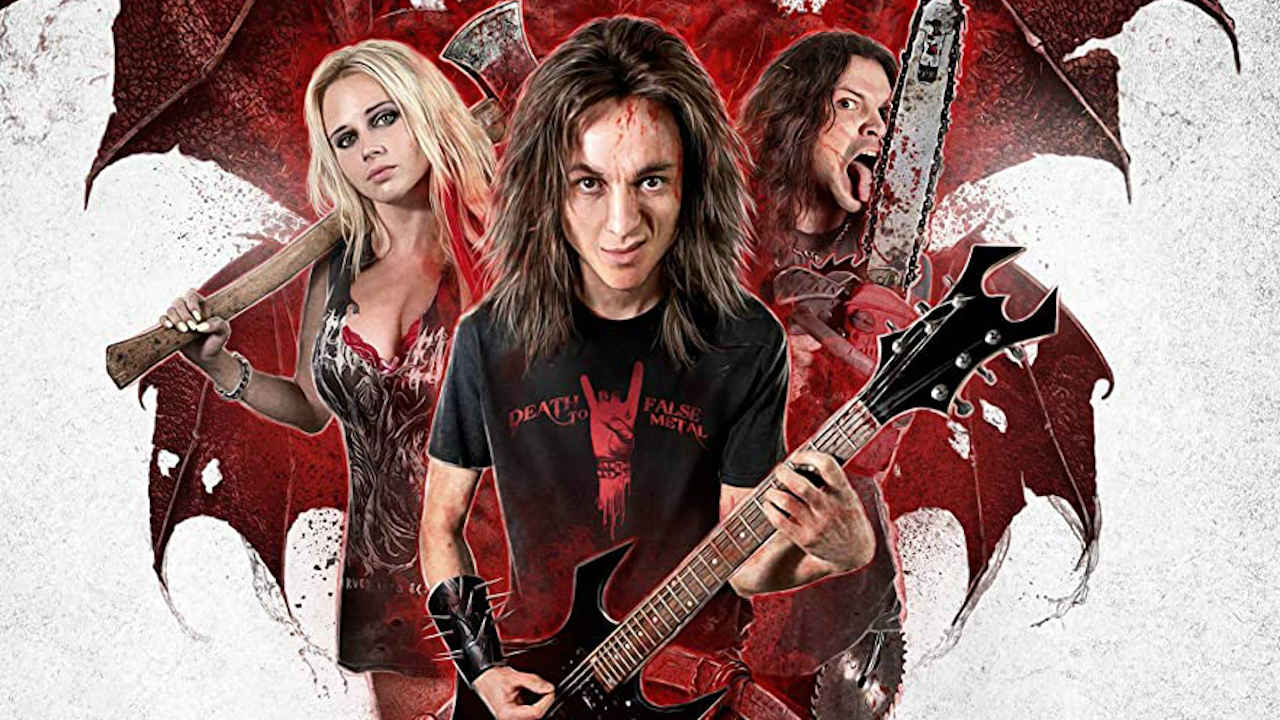A cadaver on a pentagram shits out its own intestines. A Flying V guitar flies headfirst into an amplifier and unleashes an army of ghosts. A faceless metalhead rocks out wildly while playing a massive penis like an electric guitar.
No, this isn’t a description of some nightmarish fever dream, or what greets you as you step up to the gates of Hell. This is what you see in the space of the first minute when you put on Deathgasm: the maddest heavy metal horror film ever made.
If you’re an aficionado on all things black, death and/or thrash metal and you haven’t watched this batshit mad Kiwi gorefest, you’re doing it all wrong. Written and directed by New Zealand filmmaker and near-lifelong metalhead Jason Lei Howden, this 2015 splatter comedy is what would happen if you somehow crammed Cannibal Corpse, Venom and Slayer art onto celluloid.
Its plot follows young guitarist Brodie, who co-helms an underground metal band called Deathgasm. Yearning for the big time that every teenage band dreams of, he steals sheet music from his reclusive rock star idol, only to find that by playing it he’s opened up the underworld, flooding his small town with a legion of demons.
Don’t roll your eyes if reading that summary makes you think “That sounds like the plot of every ’80s horror B film ever made!”, because that’s the point. Deathgasm is, by design, Evil Dead meets Spinal Tap.
“I was a death metal kid back in the ’90s and my mates and I would watch a lot of splatter films,” told Metal Hammer in 2015. “We wanted to see ourselves doing those things – going out there and kicking ass and running around with chainsaws. There were some heavy metal horror films in the ’80s but no real splatter ones. I finally got the opportunity to do it.”
True to his word, Howden didn’t hold back on the gore-soaked, guitar-soundtracked lunacy. The gruesome opening is just the tip of the iceberg; Deathgasm is laden with sex, swearing and bloodthirst throughout. Boobs bounce with reckless abandon and everybody calls everybody else a cunt, until a glorious climax that depicts our hero fighting off a demonically possessed middle-aged couple with the frighteningly large sex toys he finds under their bed. Such was Howden’s commitment to his passion project that he went out and bought the pelvis-obliterating props himself.
“I’m willing to sell them if anyone is keen,” he said a few months after the film’s release. “They are still soaked in fake blood.”
Much like Howden, even the characters in Deathgasm are aware of how ridiculously viscera-drenched what they’re involved in is. In one of the film’s funniest scenes, a man in black reports back to the shadowy cult he works for, having failed to stop Brodie from getting his hands on his demon-summoning tablature. The cult head’s response is to have his minions decapitate his underling there and then – only to learn the hard way the extent of the mess it would cause. “Oh, come on! That’s a custom-made Satori rug, idiots!” he howls at the bloodbath in front of him. “You put a tarp down first!”
Despite all the horror though, Deathgasm has a heart of gold, making it more of a Corpsegrinder than an Anal Cunt. A key driving force for Howden when making the film was to strike back at the Hollywood productions that depict metalheads as either idiots (This Is Spinal Tap, Wayne’s World) or arseholes (Hesher, Rock Of Ages). “We’re not bullies, we’re not stupid; we’re just normal kids who happen to love metal,” he told Hammer.
As a result, Brodie is a likeable and courageous – if in-over-his-head – protagonist. He’s kind, funny and determined to undo the horror he’s wrought on his town by playing the occult music that caused the apocalypse backwards – or, as he puts it, “Rob Halford-style”. His relationship with his non-metalhead love interest, Medina, is the emotional core of the film, and his explanation of why he adores heavy music is the best rationale for metal’s devout following in all of cinema: “When life sucks, and you feel alone and empty, stick on metal and it gets better, because someone else knows the pain and rage you’re going through.”
Arguably even better is that Deathgasm puts its money where Brodie’s mouth is with its excellently extreme soundtrack. Songs come courtesy of scene-wide icons like Emperor all the way to unknown up-and-comers, such as Elm Street and Axeslasher. Howden even approached a local New Zealand black metal band called Bulletbelt and asked them especially to compose the main theme for the film. The song, also entitled Deathgasm, is a depraved assault of first-wave BM à la Bathory and Venom. It’s on Spotify, so give it a stream.
If the soundtrack doesn’t convince you of how legitimate a metalhead Howden is, then Deathgasm’s in-jokes absolutely will. Not only is there the Rob Halford quip, acknowledging when Judas Priest got sued for allegedly putting pro-suicide messages in their music when played backwards; there’s also when Brodie first meets his future bandmate Zakk. The pair are flicking through LPs at a record shop, silently judging each other’s picks, only for Brodie to recoil in horror when he accidentally picks up a Poison album.
Thanks to both its ridiculous gore and authentic love for heavy metal music, Deathgasm was a sleeper hit that won an ardent fanbase and a handful of film festival awards. Hype for a sequel was high for years, and Howden had big plans for it. He tapped Serj Tankian for the soundtrack and, on Twitter, promised “more gore in the first 10 minutes than the entire first #deathgasm”.
Sadly though, the followup never materialised. The New Zealand Film Commission, a government agency that helped with the first Deathgasm, shot the notion of a sequel down, with Howden claiming (probably jokingly) that they considered the idea “too commercial”. As a result, what we’re left with may be a one-and-done cult classic, but it’s undeniably the maddest, goriest, sexiest and, at times, most touching tribute to heavy metal in the history of cinema.

